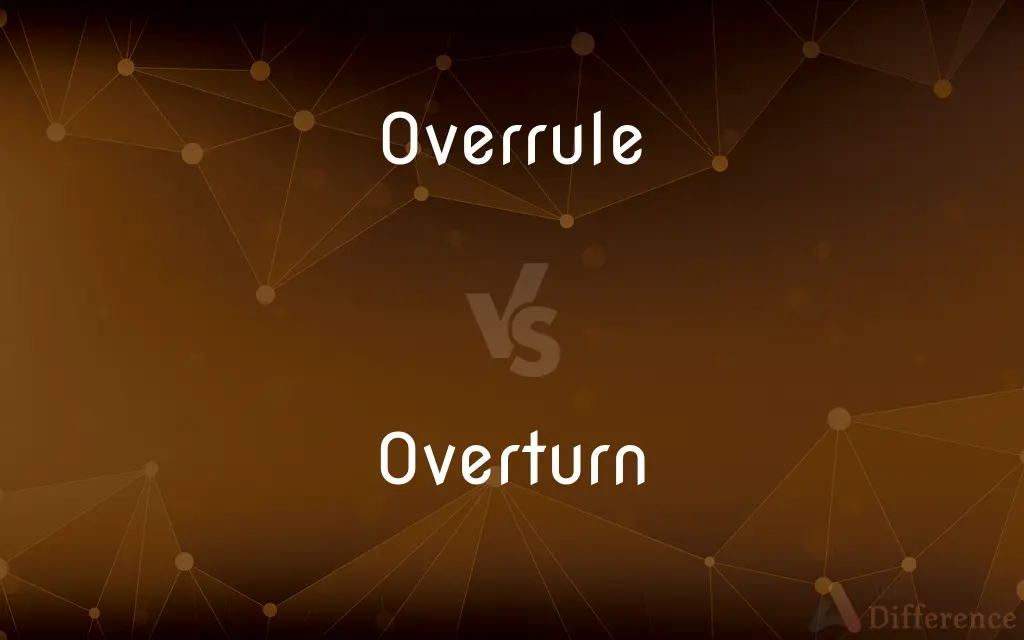Overrule vs. Overturn — What's the Difference?
By Tayyaba Rehman & Urooj Arif — Updated on May 2, 2024
To overrule generally refers to a decision by someone in authority to reject or nullify a previous decision, while to overturn is to completely reverse a decision, often implying a change in direction or precedent.

Difference Between Overrule and Overturn
Table of Contents
ADVERTISEMENT
Key Differences
Overruling occurs when someone in a position of authority, such as a judge or a leader, decides against a previous ruling or decision. On the other hand, overturning is specifically about reversing a decision, often used in legal contexts to describe when higher courts reverse the decisions of lower courts.
Overrule can apply in various contexts, including administrative, legal, and personal scenarios where a decision by a subordinate or previous authority is rejected. Whereas, overturn is more dramatic, implying a complete reversal and often associated with corrections of errors or changes in policy.
The effect of overruling is typically that the original decision no longer stands as it was, but it does not necessarily mean a reversal; it may simply alter parts of the decision. On the other hand, overturning means the previous decision is completely reversed and a new precedent or outcome is established.
Overruling can be seen in everyday situations where a superior corrects or changes the decisions of others under their oversight. Conversely, overturning is a term mostly reserved for significant changes, such as in law or major organizational policies.
The authority involved in overruling is often ongoing and part of routine oversight, reflecting a hierarchical structure. In contrast, the authority to overturn something usually stems from a specific legal or formal challenge to an existing state of affairs.
ADVERTISEMENT
Comparison Chart
Definition
To reject or nullify a decision or ruling
To reverse a decision or ruling completely
Contexts
Legal, administrative, personal
Primarily legal, significant policy changes
Implication
Decision is modified or rejected
Decision is completely reversed
Typical Usage
Routine authority use, hierarchical
Legal appeals, major policy shifts
Outcome
Alters or negates original decision
Sets a new precedent, nullifies original
Compare with Definitions
Overrule
To reject or disregard a decision or suggestion.
The manager overruled the team’s choice of venue.
Overturn
To reverse a decision or policy entirely.
The court’s decision was overturned on appeal.
Overrule
To decide against a previous rule or suggestion.
Her objection was overruled by the committee.
Overturn
To invalidate a rule or law completely.
The new legislation overturned previous regulations.
Overrule
Making a new decision that disregards the previous one.
The director overruled the proposed budget cuts.
Overturn
Complete reversal of a legal judgment.
The higher court overturned the conviction.
Overrule
Authority intervention to change an existing decision.
The objections were overruled by the council.
Overturn
To cause a complete shift in an established order.
The policy was overturned after widespread protest.
Overrule
Authority’s action to nullify a subordinate's decision.
The senior judge overruled the earlier verdict.
Overturn
To radically change the direction of a prior decision.
The board voted to overturn the earlier strategy.
Overrule
To declare (a court ruling or other precedent) as superseded and no longer accurate with regard to a legal question
In Brown v. Board of Education, the Supreme Court overruled Plessy v. Ferguson.
Overturn
Overturn is a video game developed by Japanese company Studio Zan for WiiWare. It was released in Japan on December 2, 2008, in North America on August 3, 2009, and in Europe on February 12, 2010, by Gamebridge as Overturn: Mecha Wars.
Overrule
To reject or disallow as contrary to rules or law
The defense attorney's objection was overruled by the judge.
Overturn
To cause to turn over; upset or flip over
Large waves overturned the raft.
Overrule
To reject or annul (a decision or recommendation, for example)
Overrule a decision about hiring a job candidate.
Overrule a call by an umpire.
Overturn
To cause to fall over; knock or topple over
Bumped the vase and overturned it.
Overrule
To reject or annul a decision made by (someone)
Overrule an umpire.
Overturn
To ransack
Found that the room had been overturned during the night.
Overrule
(transitive) To rule over; to govern or determine by superior authority.
Overturn
To cause the downfall, destruction, or ending of; overthrow or abolish.
Overrule
(transitive) To rule or determine in a contrary way; to decide against; to abrogate or alter.
Overturn
(Law) To invalidate or reverse (a decision) by legal means
"his continuing legal battles to overturn a draft-evasion conviction" (Robert Lipsyte).
Overrule
(transitive) To nullify a previous ruling by a higher power.
The line judge signalled the ball was in, but this was overruled by the umpire.
Overturn
To turn over or capsize
The car went off the road and overturned.
Overrule
To dismiss or throw out (a protest or objection) at a court.
Overturn
The act or process of overturning
The court's overturn of a ruling.
Overrule
To rule over; to govern or determine by superior authority.
Overturn
The state of having been overturned.
Overrule
To rule or determine in a contrary way; to decide against; to abrogate or alter; as, God overrules the purposes of men; the chairman overruled the point of order.
His passion and animosity overruled his conscience.
These [difficulties] I had habitually overruled.
Overturn
The periodic mixing or circulation of water in a lake or sea as a result of changing temperature of its layers.
Overrule
To supersede, reject, annul, or rule against; as, the plea, or the decision, was overruled by the court.
Overturn
To turn over, capsize or upset.
Overrule
To be superior or supreme in rulling or controlling; as, God rules and overrules.
Overturn
(transitive) To overthrow or destroy.
Overrule
Rule against;
The Republicans were overruled when the House voted on the bill
Overturn
To reverse (a decision); to overrule or rescind.
Overturn
(transitive) To diminish the significance of a previous defeat by winning; to make a comeback from.
Overturn
(intransitive) Of a body of water: to undergo a limnic eruption, where dissolved gas suddenly erupts from the depths.
Overturn
A turning over or upside-down; inversion.
Overturn
The overturning or overthrow of some institution or state of affairs; ruin.
Overturn
To turn or throw from a basis, foundation, or position; to overset; as, to overturn a carriage or a building.
Overturn
To subvert; to destroy; to overthrow.
Overturn
To overpower; to conquer.
Overturn
The act off overturning, or the state of being overturned or subverted; overthrow; as, an overturn of parties.
Overturn
The act of upsetting something;
He was badly bruised by the upset of his sled at a high speed
Overturn
An improbable and unexpected victory;
The biggest upset since David beat Goliath
Overturn
Turn from an upright or normal position;
The big vase overturned
The canoe tumped over
Overturn
Cause to overturn from an upright or normal position;
The cat knocked over the flower vase
The clumsy customer turned over the vase
He tumped over his beer
Overturn
Rule against;
The Republicans were overruled when the House voted on the bill
Overturn
Cause the downfall of; of rulers;
The Czar was overthrown
Subvert the ruling class
Overturn
Annul by recalling or rescinding;
He revoked the ban on smoking
Lift an embargo
Vacate a death sentence
Overturn
Change radically;
E-mail revolutionized communication in academe
Common Curiosities
What is the difference between overrule and overturn?
Overruling involves rejecting or changing a decision, while overturning is the complete reversal of a decision.
Is overruling common in business settings?
Yes, in business settings, superiors often overrule decisions made by their subordinates as part of routine management.
Can a lower court overturn a higher court's decision?
No, typically a lower court cannot overturn a decision made by a higher court; it can only be done by an equal or higher level of judicial authority.
How does overruling affect workplace dynamics?
Overruling in the workplace can impact authority dynamics, potentially affecting morale if not handled with care.
What legal implications does overturning a decision have?
Overturning a decision can set new legal precedents and is often seen in appellate courts.
Can an individual’s decision be overturned?
Yes, an individual’s decision can be overturned if challenged through appropriate legal or organizational channels.
Is overturning more common in certain legal systems?
Overturning is more common in common law systems where precedent plays a significant role in legal decisions.
Who has the power to overturn a verdict?
Generally, only appellate or supreme courts have the power to overturn a verdict from a lower court.
What are the consequences of overruling a decision?
Overruling can lead to changes in procedures or practices and might affect the credibility of the initial decision-maker.
Does overturning a decision always imply an error was made?
Often, overturning a decision implies a recognition of errors or changes in understanding, though it can also reflect shifts in societal values.
How can overruling be perceived in public governance?
Overruling in public governance can be seen as a corrective measure but might raise concerns about stability or consistency.
Can policies be overruled?
Policies can be overruled by those in higher authority within an organization, reflecting changes in strategy or corrections.
What happens after a law is overturned?
When a law is overturned, it is no longer in effect and can lead to changes in legal practices and societal norms.
What are the criteria for a court to overturn a decision?
Courts typically require substantial legal misinterpretation or procedural errors to overturn a decision.
What role does new evidence play in overturning decisions?
New evidence can be crucial in overturning decisions, particularly in judicial processes where it can significantly alter outcomes.
Share Your Discovery

Previous Comparison
Refer vs. Referral
Next Comparison
Liturgy vs. MassAuthor Spotlight
Written by
Tayyaba RehmanTayyaba Rehman is a distinguished writer, currently serving as a primary contributor to askdifference.com. As a researcher in semantics and etymology, Tayyaba's passion for the complexity of languages and their distinctions has found a perfect home on the platform. Tayyaba delves into the intricacies of language, distinguishing between commonly confused words and phrases, thereby providing clarity for readers worldwide.
Co-written by
Urooj ArifUrooj is a skilled content writer at Ask Difference, known for her exceptional ability to simplify complex topics into engaging and informative content. With a passion for research and a flair for clear, concise writing, she consistently delivers articles that resonate with our diverse audience.













































